AFC Live: Making Peace With Discomfort In Order to Advance Equality
There is no growth in your comfort zone and no comfort in your growth zone.
We all know that feeling when we have said the wrong thing. For many of us, our stomachs sink and a hot flush of shame races across our skin. We might wish we could pull the words back into our mouths and seal our lips together to prevent any more offenses from slipping out. Or, perhaps we want to retreat from the conversation, and others like it, to talk about easier or lighter topics.
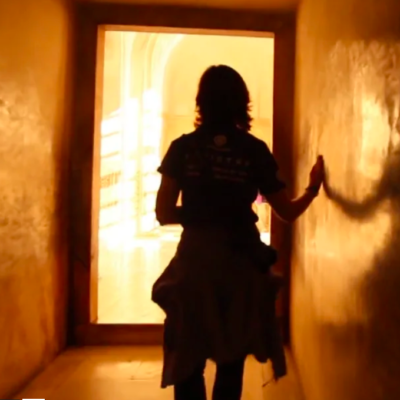 Talking about race is hard. And, if we challenge ourselves to talk about it enough, we will get things wrong. We will ask the wrong question or say the wrong thing. But, what if instead of retreating, we chose to step even further into the discomfort? What if choosing to be uncomfortable is the first step to creating real change in the world?
Talking about race is hard. And, if we challenge ourselves to talk about it enough, we will get things wrong. We will ask the wrong question or say the wrong thing. But, what if instead of retreating, we chose to step even further into the discomfort? What if choosing to be uncomfortable is the first step to creating real change in the world?
Since George Floyd was murdered, many books on race have reached the top of the NYT Best Sellers list, including White Fragility, which challenged me, personally, to think about racism from a different perspective. Author Robin DiAngelo talks about how racism is a structure and not an event, and that as white people – we are racist – because we were born into a racist system. She says that if we can start from that place, we don’t have to waste energy defending how “not racist” we are and, can instead, direct that energy into helping to change the racist structures in our system.
Here is a passage from her book, which I highly encourage every white person to read:
I expect that white readers will have moments of discomfort reading this book. This feeling may be a sign that I’ve managed to unsettle the racial status quo, which is my goal. The racial status quo is comfortable for white people, and we will not move forward in race relations if we remain comfortable. The key to moving forward is what we do with our discomfort. We can use it as a door out – blame the messenger and disregard the message. Or, we can use it as a door in by asking, Why does this unsettle me? What would it mean for me if this were true? How does this lens change my understanding of racial dynamics? How can my unease help reveal the unexamined assumptions I have been making? Is it possible that because I am white, there are racial dynamics that I can’t see? Am I willing to consider that possibility? If not, then why not?
Many of us, including me, would like to fast track through discomfort and get to the other side as quickly as possible. But, truly doing the work to understand our white privilege and to dismantle systems and biases that have been around for hundreds of years takes time. We can’t take one action and then check a box because we feel like we’ve done our part and earned the right to move on. There is no moving on from this incredibly important issue.
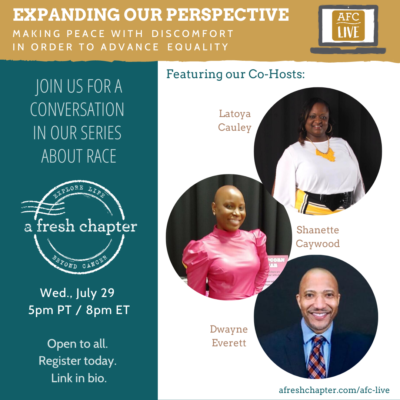 This is just one of the reasons why we’re turning last month’s conversation about race into a multi-part series. Yes, AFC is an organization with a mission to heal the emotional scars of cancer, but we’re also an organization that believes that volunteering and serving the causes we care about helps us heal. Given our work in diverse cultures and communities – both in the U.S. and overseas – we have built a community of people who are passionate about social justice. Through applying the tools we teach in our AFC programs, we will continue to create safe places to have challenging conversations and promote action while building an even stronger community.
This is just one of the reasons why we’re turning last month’s conversation about race into a multi-part series. Yes, AFC is an organization with a mission to heal the emotional scars of cancer, but we’re also an organization that believes that volunteering and serving the causes we care about helps us heal. Given our work in diverse cultures and communities – both in the U.S. and overseas – we have built a community of people who are passionate about social justice. Through applying the tools we teach in our AFC programs, we will continue to create safe places to have challenging conversations and promote action while building an even stronger community.
In our AFC Live this month, we will welcome back our co-hosts Shanette Caywood, Latoya Cauley, and Dwayne Everett for Part 2 of Expanding Our Perspective – A Series about Race. This month’s theme is Making Peace With Discomfort In Order to Advance Equality, and you can sign up here to join us on Wednesday, July 29th at 5 pm PT / 8 pm ET.
During our call, we’ll talk more about white fragility and discomfort and then transition to talking about equality and what it really means to advance equality. We will hear from our co-hosts, and we look forward to hearing from you. To get us started, our co-hosts and a member of the AFC Team have offered their own answers to some uncomfortable questions about race.
***
What questions are you tired of answering?
I am tired of answering these two questions:
- What can I do?
- How are you doing?
 What can I do? This question feels and seems so lame. I realize people care and sincerely want to help, but it is truly exhausting and this question feels so empty and self-serving. For example: if a person falls down and you see it, you don’t ask them what can you do or how can you help. You simply use your common sense and offer to help them up. I really don’t know what you should be doing to help. This is a question that I feel you need to ask yourself. Dig deep and ask yourself – are you a part of the problem or the solution? There are so many things one can do to help. It is the duty of the steward, not the one needing help to examine the situation and find ways to help. Think about it – in most cases when you ask someone how or what they need, they usually answer by saying nothing or I’m ok. This is the case because of pride, shame, modesty, or they simply don’t know at the time.
What can I do? This question feels and seems so lame. I realize people care and sincerely want to help, but it is truly exhausting and this question feels so empty and self-serving. For example: if a person falls down and you see it, you don’t ask them what can you do or how can you help. You simply use your common sense and offer to help them up. I really don’t know what you should be doing to help. This is a question that I feel you need to ask yourself. Dig deep and ask yourself – are you a part of the problem or the solution? There are so many things one can do to help. It is the duty of the steward, not the one needing help to examine the situation and find ways to help. Think about it – in most cases when you ask someone how or what they need, they usually answer by saying nothing or I’m ok. This is the case because of pride, shame, modesty, or they simply don’t know at the time.
How are you doing? This question grates on my nerves because in some ways I am doing fine because these issues have been going on forever. It boggles my mind that people haven’t asked me this when numerous events, like the George Floyd incident, happened in the past. I realize most people are sincere and are now just recognizing these things happen, which is sad and another story.
~ Dwayne Everett (AFC Alum & AFC Live Co-Host)
What will be an indication to you that the current race conversation is more than a passing social trend or the cause of the moment?
 When my peers and I discussed this, we agreed that indications of change would be when they (white people) stop trying to pacify us with meaningless gestures like painting the street, trying to stop using the word master when it comes to bathrooms and bedrooms or changing the picture of a syrup bottle. These things are good, bring awareness, and start the conversation. But what we really need is a substantial change in the systematic way the police interact with us. We also need funding for schools so that our education looks like that of rich white students and we need school programs that teach the basics of living.
When my peers and I discussed this, we agreed that indications of change would be when they (white people) stop trying to pacify us with meaningless gestures like painting the street, trying to stop using the word master when it comes to bathrooms and bedrooms or changing the picture of a syrup bottle. These things are good, bring awareness, and start the conversation. But what we really need is a substantial change in the systematic way the police interact with us. We also need funding for schools so that our education looks like that of rich white students and we need school programs that teach the basics of living.
When the mainline conversations start being about correcting redlining policies, and the inequities of fresh fruits and veggies in our neighborhoods (food deserts). Only when these things start to happen in mainline (news outlets, boardrooms and congressional hearings, etc.) conversations will it be evident that change is on the horizon.
~Latoya Cauley (AFC Alum & AFC Live Co-Host)
What changes would you like to see today that will make the world a better place for your children and future generations?
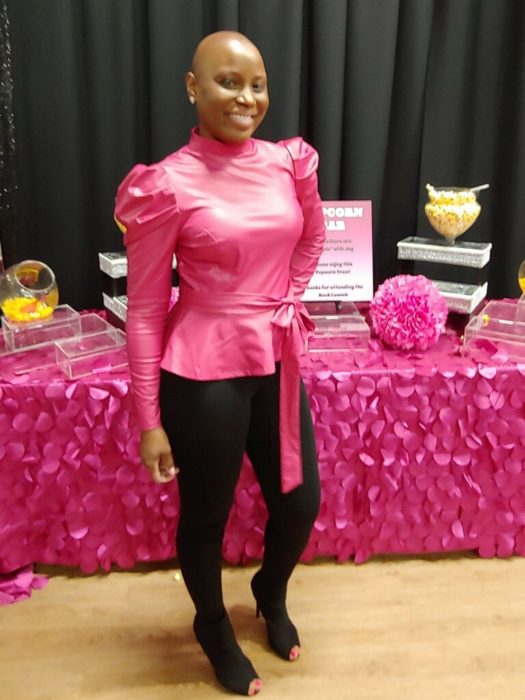 As a mother of 2 young African American men, it pains me to think of the inequalities and unfairness they may experience in life and only because of who they are (young black men). My boys are 21 and 13, and I make sure to have conversations with them regarding what’s going on in the world and listen to their opinion on what they feel needs to be changed. My 13-year-old feels it’s really wrong that blacks are treated differently and believes that more protests and changing laws will help to create equality. My 21-year-old, although he has never had an experience with the police or racism, feels major changes need to be made within society for true change to be seen. My belief is this begins with parents and leaders. Children learn through leadership and education. What I hope will change is the heart of people towards one another. I believe when we first start there, we can look within ourselves to ask the question – How can we be the leaders who create change for our children and their future? This begins with stepping out of our comfort zone(s) and culture(s) to better understand how others live. We may or may not see true change because not everyone may be willing to gain this understanding. However, for my boys and I, we will keep having conversations about how we can get involved in creating a different future.
As a mother of 2 young African American men, it pains me to think of the inequalities and unfairness they may experience in life and only because of who they are (young black men). My boys are 21 and 13, and I make sure to have conversations with them regarding what’s going on in the world and listen to their opinion on what they feel needs to be changed. My 13-year-old feels it’s really wrong that blacks are treated differently and believes that more protests and changing laws will help to create equality. My 21-year-old, although he has never had an experience with the police or racism, feels major changes need to be made within society for true change to be seen. My belief is this begins with parents and leaders. Children learn through leadership and education. What I hope will change is the heart of people towards one another. I believe when we first start there, we can look within ourselves to ask the question – How can we be the leaders who create change for our children and their future? This begins with stepping out of our comfort zone(s) and culture(s) to better understand how others live. We may or may not see true change because not everyone may be willing to gain this understanding. However, for my boys and I, we will keep having conversations about how we can get involved in creating a different future.
~ Shanette Caywood (AFC Alum & AFC Live Co-host)
What makes you uncomfortable with talking about race?
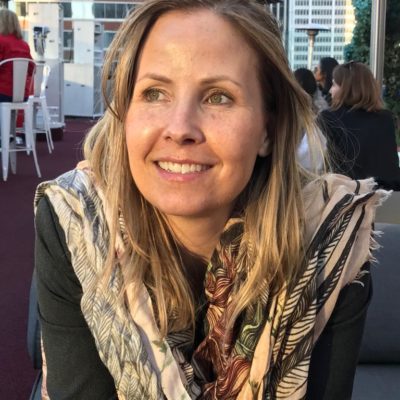 Talking about race makes me uncomfortable because I don’t want to get it wrong, hurt anybody, or appear ignorant (all of which, it turns out, are easy to do when you don’t educate yourself). For most of my life, my unconscious strategy has been: don’t talk about race. If I don’t talk about it, there is less chance for me to get it wrong, hurt someone, appear ignorant, or uncover any hint of racism – inherited or otherwise – lurking inside me. Growing up, I received the message that we’re not supposed to talk about race, and I unthinkingly accepted the benefits afforded me by our racism systems. It is painful to admit this. Since starting this work, I now understand that it’s not as simple as “racists are bad people, but I am a good person, therefore I can’t possibly be racist.” By admitting my ignorance and owning that I have hurt people and gotten plenty wrong, I now see that I can be uncomfortable with talking about race, and still talk about race. I can acknowledge my complicity in systemic racism, and through that admission hopefully become a better listener, a better ally, and an advocate for true equality. Knowing this will not take the discomfort away. I feel shame and guilt; I am still afraid of looking ignorant, hurtful, or having others say, “Wow, she’s late to the party.” That’d be fair – I sure am. And it’s uncomfortable. But what makes me more uncomfortable than anything, is going even one more day without having the conversation.
Talking about race makes me uncomfortable because I don’t want to get it wrong, hurt anybody, or appear ignorant (all of which, it turns out, are easy to do when you don’t educate yourself). For most of my life, my unconscious strategy has been: don’t talk about race. If I don’t talk about it, there is less chance for me to get it wrong, hurt someone, appear ignorant, or uncover any hint of racism – inherited or otherwise – lurking inside me. Growing up, I received the message that we’re not supposed to talk about race, and I unthinkingly accepted the benefits afforded me by our racism systems. It is painful to admit this. Since starting this work, I now understand that it’s not as simple as “racists are bad people, but I am a good person, therefore I can’t possibly be racist.” By admitting my ignorance and owning that I have hurt people and gotten plenty wrong, I now see that I can be uncomfortable with talking about race, and still talk about race. I can acknowledge my complicity in systemic racism, and through that admission hopefully become a better listener, a better ally, and an advocate for true equality. Knowing this will not take the discomfort away. I feel shame and guilt; I am still afraid of looking ignorant, hurtful, or having others say, “Wow, she’s late to the party.” That’d be fair – I sure am. And it’s uncomfortable. But what makes me more uncomfortable than anything, is going even one more day without having the conversation.
~Dana Buning (AFC Facilitator & Creative Director)
What conversation do you wish you could more easily have with white people?
 I would love to ask white people – why do you dislike black people so much when they cause you very little threat and you socialize with them very infrequently, if at all? Black people are and have been disadvantaged from day 1, so why do you fear them so much? If you truly love humanity and yourself, why do you dislike/hate another human simply because of their skin color? If you needed an organ transplant to stay alive, the organ from a black person could and would save your life because he or she is HUMAN.
I would love to ask white people – why do you dislike black people so much when they cause you very little threat and you socialize with them very infrequently, if at all? Black people are and have been disadvantaged from day 1, so why do you fear them so much? If you truly love humanity and yourself, why do you dislike/hate another human simply because of their skin color? If you needed an organ transplant to stay alive, the organ from a black person could and would save your life because he or she is HUMAN.
It is NOT normal for a first-place team to be concerned or worried about the last place team (blacks or minorities). Other white people are your main threat – not blacks. We only represent 13% of the population and are located mainly in metropolitan urban areas in the US. If this type of attitude or hate was taught to you, it is your adult responsibility to denounce it and do the right thing and LOVE all mankind. True LOVE is a natural state and action and hate is NOT. Ask yourself how and why you can hate something or someone you don’t even know. It truly makes no sense.
If we could have these simple conversations things will definitely shift in the right direction.
~ Dwayne Everett
Join us on Wednesday, July 29th, to step out of your comfort zone, into your growth zone, and add your voice to this vital conversation. Sign up here.


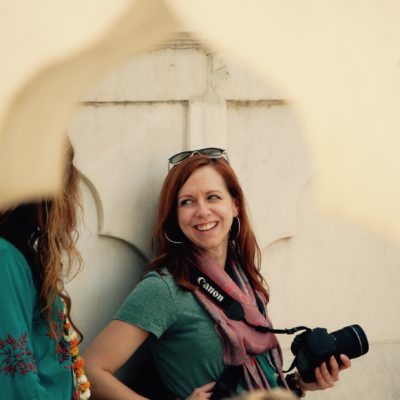
No Comments